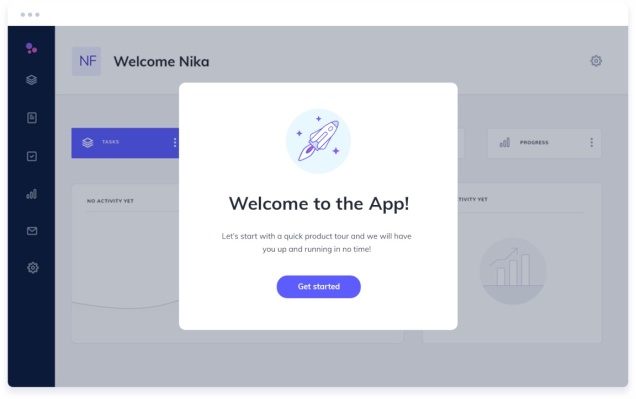User onboarding has been a longstanding and persistent challenge in the world of apps. Developers grapple with design and technical constraints; publishers and users might have different priorities when it comes to engaging with a service; the content of those services is changing all the time; and perhaps most of all, people are all different and so their experiences with an app will be, too.
Appcues — one of the startups building technology both to identify onboarding issues and then providing low-code, non-technical solutions to fix them quickly — is today announcing a $32.1 million Series B round. The funding is a sign not just of the demand in the market for more tools to address all of this, but of Appcues’ traction in doing so.
“Product experience matters more than ever. Yet it can still take weeks to get something live in your product,” said Jackson Noel, co-founder and CEO of Appcues, in a statement. The company claims that its tools can deliver insights and user onboarding fixes for customers in hours.
The Series B is being led by NewSpring, with new backer Columbia Partners and previous investors Sierra Ventures and Accomplice also participating. Boston-based Appcues plans to use the funding for product development and to expand internationally. It has raised just under $48 million to date. From what we understand, the valuation is in the region of $200 million-$300 million.
The funding is coming alongside strong growth. Appcues says that it now has some 1,500 customers — they include Freshworks, FullStory, Lyft, Zapier, Kaplan, Hopin, Pluralsight and Vidyard — and that its cloud-based platform to date has served almost 2 billion experiences to more than 200 million users.
Appcues has been around since 2014, when it got its start as a SaaS toolset for marketers to create quick prompts on sites without having to involve developers in the process, with a specific emphasis on user onboarding flows. The company’s product today also covers flows to improve feature adoption, to nudge people to take feedback surveys, and to get visitors to read announcements but is still built on the same premise: giving non-technical people the ability to create dialogues to improve how their digital interfaces work.
The process starts with an SDK that can either be installed as a line in an app’s codebase or integrated by way of Segment. This tracks events on the site, and that becomes the basis for how it works.
The SDK is key to how Appcues works, Noel said in an interview: “It feels like a native extension, not an external app,” he said. “Our goal is to triple down on that area and helping our users create the best product experiences.” He said this also differentiates it from others in the same general field, who might be focusing on app flows, or employee training or something else.
Appcues’ users — they can be UX people, product managers, interactive marketers, or yes developers — can now access this data by way of a Chrome extension to see what’s working as intended, and what is not, on their apps or sites; and they can start to build new events or flows in response to these. Different flows and events can be created for different segments of users, depending on where they are coming from into an app; or how they are already using it. Users can then track how well these new flows and events are working, and tweak them, or add new flows, as needed.
User experience arguably is even more important today than it has ever been before: not only do people have shorter attention spans for things that work badly (we are all spoiled for choice when it comes to digital services); but companies are working with more and more complexity and putting a lot of eggs into their digital baskets, which are often the only platforms being used to engage with customers. Getting something wrong here can make or break a business in ways that didn’t exist before.
So it’s no surprise that there are a number of companies also building technology to address this, and that doing so can be very big business. Others include WalkMe (which is now public), Pendo (now also en route to an IPO), and Whatfix (which is more focused on organizations’ internal user onboarding) and many more.
One notable part of Appcues’ toolset is that it’s aimed at non-technical users; but the other is its focus on analytics: this both helps users of its app get a better picture of what issues there might be, and for whom; as well as to identify whether their attempts to fix it are working… or not.
And it seems that no matter how advanced or numerous the tools to fix user onboarding, the simple need for them in the first place is not going away, and is only getting more critical.
“Over the past five years, we’ve witnessed a shift where a software company’s product experience has become the number one lever to their business success,” said Marc Lederman, co-founder and general partner at NewSpring, in a statement. “We’re incredibly excited about the impact Appcues provides for its customers and look forward to supporting Jackson and the Appcues team on this next stage of growth.”







![Read more about the article [Funding alert] MoEngage raises $77M in Series E led by Goldman Sachs Asset Management & B Capital](https://blog.digitalsevaa.com/wp-content/uploads/2022/06/MoEngagefinal-1654087623414-300x150.png)


